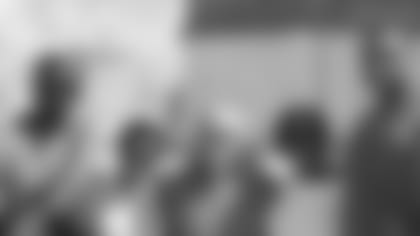The team in the dark blue jerseys was doing it again. As they had done throughout all of last season, these skilled football players were running roughshod over, around and through yet another opponent.
At home, on the road ... it never seemed to matter. The result was almost always the same: a convincing victory. This particular contest was unfolding on the crisp FieldTurf surface in the stadium built by Robert Kraft, who was on-hand to witness the show.
The juggernaut piled up 38 points in its last regular-season game, then did as expected and eventually wound up in the championship. It turned out to be a relatively low-scoring nail-biter to the very end. Yet, when the dust cleared, the men in blue found a way to capture the title.
No, this did not take place in New England, but several thousand miles away in Israel.
In March, Big Blue Jerusalem, which plays its home games at Israel's Kraft Family Stadium, was crowned champion following the inaugural season of the Israel Football League (ISL), that nation's first fully-equipped tackle football league.
"I am thrilled to be in Israel watching tackle football for the first time," Kraft told a local reporter at Big Blue's regular-season finale, a 38-0 drubbing of Mike's Place Tel Aviv. "I get a special feeling in my heart every time I hear Hatikva [the Israeli national anthem] sung on a football field and hope to help this sport grow in this country."

Toward that end, Kraft invited a pair of ambassadors for the game of football, Patriots tight end Benjamin Watson and defensive end Richard Seymour, on the weeklong journey to the Holy Land.
"Part of the reason we went was to see Mr. Kraft's stadium. It has a nice turf field with a Patriots logo," Watson explained. "They really respect him a lot over there. He's done a lot for their community."
Watson first became interested after hearing teammate Tom Brady rave about his trip to Israel with the Kraft family a couple of years ago. But it took a chance encounter with Kraft's wife, Myra, last year for Watson's opportunity to arise.
"Mrs. Kraft was in the training room getting work done on her foot or something. So we started talking about Israel, and she said, 'You should go.' My wife Kirsten and I got the official invite from Mr. Kraft a little while later."
The Krafts had asked Seymour to join them several times over the years, but each time, the lineman's wife was pregnant, which precluded them from traveling. This year, however, they were free to jump at the chance.
"I was thankful for the opportunity that Mr. Kraft and his family offered me and my wife," Seymour said upon his return.
When asked why he chose those two players in particular to make what would turn out to be much more than a football-focused trip, Kraft replied, "I knew they were both highly religious and spiritual people and I wanted to share this with them."
Something was not right. First one police car raced past the cozy little Jerusalem restaurant, sirens blaring. Then another. Then countless others.
"Seemed like every squad car in Israel was speeding past us," Watson recalled in a serious tone. He, Seymour and the Krafts were with their traveling party, enjoying a nice meal while listening to some guest speakers talk about the state of Israel.
When the police activity started, the teammates shot each other looks of concern.
It didn't really surprise them, of course, that something terrible might happen while they were there. They keep up with current events, watch the news, read their Bibles. They understand the sacred, yet volatile history of the place they were visiting.

Life in Israel has always been rooted in faith. Centuries before it became a nation 60 years ago last month, the land now known as Israel was considered sacred by all three major religions: Judaism, Christianity and Islam. Moses led his people there out of slavery in Egypt; Jesus was born and preached there; Mohammed is believed to have ascended into heaven from there.
Barely bigger than Massachusetts, it has nonetheless been the source of incessant hostilities as far back as the 12th century B.C. Its name has evolved - from Canaan to Palestine to Israel - as have its borders. It has succumbed to foreign invasion, changed ruling hands numerous times and in recent years witnessed internal strife between its Arab and Jewish inhabitants.
"Part of the thing in Jerusalem," Watson remarked, "you see Muslims and Christians and Jews. They all consider Jerusalem a very important city. And you see them all there not fighting. But then maybe you go a few miles east, and obviously there's a lot of fighting. It's a very small country, but there are two different worlds."
On this night, midway through the Patriots contingent's trip, those worlds collided violently. The Americans found themselves as close as safely possible to one of the more heinous attacks in Jerusalem's recent memory.
Authorities were responding to the scene of the crime, the library of a rabbinical seminary about two miles from where Watson, Seymour and the Krafts were dining. A gunman entered the building and opened fire, killing eight, wounding nine others, all of whom were there for a nighttime study session. The perpetrator was then shot dead by an Israeli soldier.
"It's amazing how fast the news picks stuff up," Watson continued. "It's being broadcast all over the world, and we're sitting there, in Jerusalem, only a few miles away, watching it on TV. They interrupted [the speaking program] for everyone to call home and let our families know we were OK. Then I got a call from my wife's grandfather in Baton Rouge. He said, 'You bring my baby home.'"
Yet, despite some initial apprehension, the players didn't feel fearful. They seemed to take a matter-of-fact approach to it, a lesson they learned by watching Israeli residents deal with the crisis.
"We had security, we were in a safe environment, but that's the kind of thing that goes on over there, and it's one of the reasons why you're always skeptical," said Seymour. "You know, is it at peace over there right now or not? Just like anywhere, there's always [a risk of] terrorist attacks, but we were safe and were able to get back out there.
"They have one of the best militaries [in Israel]. We had some special [forces] around us. I didn't at all feel threatened or feel uneasy, even though when that one incident happened, the shooting, that's one of those incidents that can take place anywhere."
Unfortunate as that episode was, it gave Kraft and his players an opportunity to discuss some serious issues. How the often-sheltered lives of residents here in U.S. are becoming less and less immune to terrorist activity, and how best to deal with that potential threat.
When the speaking programs resumed, the group heard competing views from their guests (mostly Israelis) on how to solve the current Israeli-Palestinian conflict. The players recounted how some supported a cease-fire, while others called for military action. Another camp wanted the U.S. to get more involved.
The attack also taught the players an important lesson about how to cope with tragedy.
"Where we were, it seemed like business as usual," Watson noted. "But the next day, people were out, walking around, carrying on like nothing ever happened. To an extent, that's the way it has to be. The next day, we kind of moved on."
Watson added that his USO Tour to Iraq last spring helped prepare him for what he experienced that fateful night in Jerusalem. There, he saw first-hand how U.S. military personnel had to cope with the loss of close friends on the battlefield, while staying vigilant about their own personal safety. He learned that even in matters of life and death, it is imperative to move on with courage.
"I kind of expected it," he said of the way Israelis dealt with the library massacre.
"For a foreigner going over to Israel, you might have preconceived notions about what it's going to be like. You may be scared to death about getting off the plane. Then you get off and realize, people aren't just outside shooting everywhere. This is a vibrant country, with very bright people, very bright minds. They're doing a lot, business-wise. They have families like we do. They want to live life.
"That's the thing: The media shows you so much and does a great job, but sometimes you may think that's all that goes on in Israel, what we see on TV. When I told my friends I was going to Israel, they said, 'Are you crazy?' Granted, it's a volatile area, but the whole country isn't like that."

That one night of despair aside, the players saw and experienced much in Israel that gave them hope. Already deeply religious, both Seymour and Watson gained an increased appreciation for their faith.
Seymour, who travels often but typically chooses beach resorts that allow for a lot of lying around, was grateful for the change of scenery and an active itinerary.
"I've been reading up on [the Holy Land] for a while, and it was the first time that the things I've been reading about I've been able to see. So, it really came to life for me. It was an awesome opportunity."
"It was exciting to go there and actually see those places you read about," Watson agreed. "The Sea of Galilee, Jerusalem, Nazareth, the Valley of Armageddon, all the things you've been reading about in the Bible.
"I really didn't know what to expect. As a Christian, obviously, that's where it all happened, in that area. I didn't know how I was going to feel going to Jerusalem where Jesus was crucified. Seeing all that, I didn't really have this out-of-body feeling, but what I did feel was that you have to be strong in your faith, and not have it be tied to places or artifacts.
"It was great to go to these Biblical places, and I saw people from all over the world converging on these sights. But it made me realize that if all you're looking for is those sights, then you've missed it. So I almost got sad at one point, because I felt like for some folks, that was it for them. It just kind of renewed my feeling of wanting to spread the Gospel."
Of all the historic religious sites they visited, each player listed one in particular that they'll remember most. Though the Jordan River, where the Bible says Jesus received his sacrament from John the Baptist, wasn't on the original itinerary, the players asked their owner if arrangements could be made to go there. Kraft did not disappoint.
When the group arrived, they found that, like almost any other tourist trap, the Jordan had been overrun with commercialism. But that didn't deter them from fulfilling a dream. Watson and Seymour baptized their wives, then their spouses performed the rite on them.
"It was really nice. Mr. Kraft watched and was a part of it. It was nice," Watson said wistfully.
"It was just a very awesome experience," added Seymour. "All the places, the sites, the history, all the different cultures and different religions. But they're still able to live next to one another. It's a lot different than what it is here, too [in the U.S.]. Makes you appreciate what you have here, too."
Unlike Big Blue Jerusalem, the Patriots didn't finish last season with a championship victory. But it is June now, a month away from the start of training camp and a whole new quest for the Lombardi Trophy.
A few months have passed since Watson and Seymour visited Israel, a trip that came on the heels of perhaps the most stunning Super Bowl loss since 1969, when the upstart New York Jets of the then-AFL fulfilled Joe Namath's guarantee of beating the NFL powerhouse Baltimore Colts.
Still, even though they were watching football for part of the time there, the players feel that having gone so far away from home helped them put that painful loss to the Giants behind them.
"Obviously it was a rough way to end the season," Watson observed. "I thought about that when I was over there. I wasn't even thinking about football. I wasn't thinking about the game we lost, I wasn't thinking about anything. So, it was good to get away, and get far away, to get refocused.
"Whether we won or lost, it's a new season. Coach [Bill] Belichick will be the first to say, 'It's a new season. Last season doesn't matter at this point.' It's all about going forward. So, it helped [to go away]. I think it's important, no matter what your job, to take some time and go away and rejuvenate."
For Seymour, it also helped remind him to put football in its proper perspective.
"It's a game. It's a game that I love and I wouldn't trade my job for anyone else's. I really enjoy and love doing what I'm doing, but at the same time, you have to prioritize things and realize where things fall in line. Obviously, my spiritual life, my family and then comes my job. That's the way I try to prioritize. It doesn't always work that way, but that's the way I try to get things done in my life."
At the same time, each player realizes that if it weren't for football, they likely wouldn't ever have had the chance to take such memorable journeys. Watson has traveled to more than a dozen foreign countries and met so many interesting people along the way.
"I tell Kirsten what a blessing it is. I would never have gone, or been too scared to go to half of these places," Watson admits. "But because of football, I've had the opportunity to go and see the world. I love to travel and meet people. I met the Prime Minister of Israel. I mean, who does that? What's important is to take time and be thankful for the opportunity."
"Every offseason, I try to travel, but the last few seasons I haven't been able to, with injuries and my wife being pregnant," said Seymour. "So, just to get away and see a lot of different things and different cultures, the way different people live, it was an eye-opening experience. It makes you appreciate the things that we have and the peace that we have over here. Things that a lot of times we can take for granted."
Hearing that, Kraft must no doubt be proud that his instincts were correct. And perhaps they all learned, too, that it's not so much where you go in life, but who you travel with that makes all the difference.
"It was amazing watching the two couples being baptized in the Jordan River and seeing how moved they were," Kraft recalled. "It was a great experience to share, visiting the Western Wall, the [Church of the] Holy Sepulcher ... it meant a lot to me and I think to them to be able to do this together."
This article was originally published in Patriots Football Weekly on June 11, 2008.







































